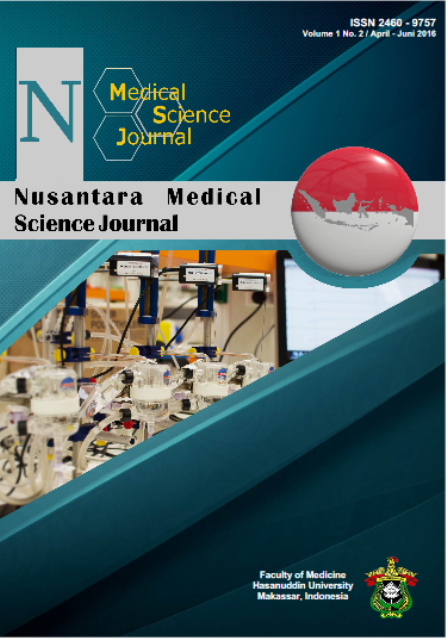ROLES OF VITAMIN C AND VITAMIN E ON DOXORUBICIN-INDUCED RENAL AND LIVER TOXICITY IN RATS
DOI:
https://doi.org/10.20956/nmsj.v1i2.2213Abstract
ABSTRACT
Introduction: Doxorubicin (DOX) is a chemotherapy agent that has potent effects against various cancer types. However, DOX may elicit renal and liver toxicity. Objectives: To examine the role of vitamin C and vitamin E in reducing DOX renal and liver toxicity. Methods: Male rats (220-330 g) were assigned to one of the treatment groups. Group I was healthy controls. Group II was given DOX (20 mg/kg b.wt). Group III was given vitamin C (250 mg/kg b.wt) for 7 days prior to DOX injection. Group IV was given vitamin E (250 mg/kg b.wt) for 7 days prior to DOX injection. Group V was given oil vehicle for 7 days prior to DOX injection. Results: Vitamin C was effective to reduce both renal and liver dysfunction. However, vitamin E protective effects were only convincing in lowering DOX-induced renal toxicity but not liver toxicity. Both vitamins prevented elevated DOX-induced oxidative stress. Conclusion: Both vitamin C and vitamin E can help to reduce DOX toxicity in rat kidney, but only vitamin C that has clear benefits on improving liver toxicity after DOX injection. Keywords: Doxorubicin, renal toxicity, liver toxicity, vitamin E, vitamin C
References
MacDonald F, Ford CHJ, Casson AG. Molecular Biology of Cancer. 2nd ed. London: Garland Science/BIOS Scientific Publisher; 2005.
Ferlay J, Soerjomataram I, Dikshit R, Eser S, Mathers C, Rebelo M, et al. Cancer incidence and mortality worldwide: sources, methods and major patterns in GLOBOCAN 2012. International journal of cancer. 2015; 136 (5): 359-386.
Menkes RI. Situasi Penyakit Kanker. Jakarta: Pusat Data dan Informasi Kementrerian Kesehatan RI; 2015. 4. Lu M, Merali S, Gordon R, Jiang J, Li Y, Mandeli J, et al. Prevention of Doxorubicin Cardiopathic Changes by a Benzyl Styryl Sulfone in Mice. Genes & Cancer. 2011; 2 (10): 985-992.
Injac R, Perse M, Obermajer N, Djordjevic-Milic V, Prijatelj M, Djordjevic A, et al. Potential hepatoprotective effects of fullerenol C60(OH)24 in doxorubicin-induced hepatotoxicity in rats with mammary carcinomas. Biomaterials 2008; 29:3451–3460.
Rashid S, Ali N, Nafees S, Ahmad ST, Arjumand W, Hasan SK, et al. Alleviation of doxorubicin-induced nephrotoxicity and hepatotoxicity by chrysin in Wistar rats. Toxicol Mech Methods. 2013; 23 (5): 337–345.
El-Moselhy MA, El-Sheikh AAK. Protective mechanisms of atorvastatin against doxorubicininduced hepato-renal toxicity. Biomedicine & Pharmacotherapy. 2014; 68 (1): 101-110.
Chatterjee K, Zhang J, Honbo N, Karliner JS. Doxorubicin Cardiomyopathy. Cardiology. 2010; 115 (2): 155-62.
Karabulut-Bulan O, Biolkent S, Yanardag R, Bilgin-Sokmen B. The Role of Vitamin C, Vitamin E and selenium on Cadmium-induced Renal Toxicity of Rats. Drug Chem Toxicol. 2008; 31(4):413-426.
Hamka IRN. Evaluasi Efek Protektif Vitamin E dan Vitamin C Terhadap Toksisitas Akut Doksorubisin Pada Ginjal Tikus Putih (Rattus norvegicus) [Skripsi]. Makassar: Universitas Hasanuddin; 2016.
Putri DPS. Evaluasi Efek Protektif Vitamin E Dan Vitamin C Terhadap Toksisitas Akut Doksorubisin Pada Fungsi Hati Tikus Putih (Rattus Novergicus) [Skripsi]. Makassar: Universitas Hasanuddin; 2016.
Amalia I. Efek Pemberian Vitamin E dan Vitamin C Terhadap Aktivitas Lipid Peroksidase Akibat Pemakaian Doksorubisin Pada Tikus Putih (Rattus Norvegicus) [Skripsi]. Makassar: Universitas Hasanuddin; 2016.
Yagmurca M, Erdogan H, Iraz M, Songur A, Ucar M, Fadillioglu E. Caffeic acid phenethyl ester as a protective agent against doxorubicin nephrotoxicity in rats. Clinica Chimica Acta. 2004; 348 (1–2): 27-34.
Kumral A, Soluk-Tekkeşin M, Olgaç V, Doğru-Abbasoğlu S, Türkoğlu Ü, Uysal M. Beneficial effects of carnosine and carnosine plus vitamin E treatments on doxorubicin-induced oxidative stress and cardiac, hepatic, and renal toxicity in rats. Human & experimental toxicology. 2015: 0960327115597468.
Kumral A, Soluk-Tekkeşin M, Olgaç V, Doğru-Abbasoğlu S, Türkoğlu Ü, Uysal M. Effect of olive leaf extract treatment on doxorubicin-induced cardiac, hepatic and renal toxicity in rats. Pathophysiology. 2015; 22(2): 117-123.
Giannini EG, Testa R, Savarino V. Liver enzyme alteration: a guide for clinicians. CMAJ : Canadian Medical Association Journal. 2005; 172 (3): 367-379.
Oozawa S, Mori S, Kanke T, Takahashi H, Liu K, Tomono Y, et al. Effects of HMGB1 on Ischemia- Reperfusion Injury in the Rat Heart. Circulation Journal. 2008; 72 (7): 1178-1184.
Puri A, Maulik SK, Ray R, Bhatnagar V. Electrocardiographic and biochemical evidence for the cardioprotective effect of vitamin E in doxorubicin-induced acute cardiotoxicity in rats. European journal of pediatric surgery. 2005;15(6):387-391.
Ludke A, Sharma AK, Bagchi AK, Singal PK. Subcellular basis of vitamin C protection against doxorubicin-induced changes in rat cardiomyocytes. Molecular and cellular biochemistry. 2012; 360 (1-2): 215-224.
Greggi Antunes LM, D'Arc C. Darin J, Bianchi MDLP. Protective Effects of Vitamin C against Cisplatin-induced Nephrotoxicity and Lipid Peroxidation in Adult Rats: A Dose dependent Study Pharmacological Research. 2000; 41 (4): 405-411.
Van den Branden C, Deman A, Ceyssens B, Pauwels M, Empsen C, Verbeelen D. Vitamin E protects renal antioxidant enzymes and attenuates glomerulosclerosis in adriamycin-treated rats. Nephron. 2002; 91 (1): 129-133.
Ajith TA, Usha S, Nivitha V. Ascorbic acid and α-tocopherol protect anticancer drug cisplatin induced nephrotoxicity in mice: a comparative study. Clinica Chimica Acta. 2007; 375 (1–2): 82-86.
Omar HE-DM, Ahmed EA, Abdel- Ghafar S, Mohammed S, Nasser AY. Hepatoprotective effects of vitamin C, DPPD, and L-cysteine against cisplatin-induced oxidative stress in male rats. Journal of Biology and Earth Sciences. 2012; 2 (1): 28-36.
Swamy AV, Wangikar U, Koti B, Thippeswamy A, Ronad P, Manjula D. Cardioprotective effect of ascorbic acid on doxorubicin-induced myocardial toxicity in rats. Indian journal of pharmacology. 2011; 43 (5): 507.
Bhattacharyya S, Mehta P. The hepatoprotective potential of Spirulina and vitamin C supplemention in cisplatin toxicity. Food & function. 2012; 3 (2): 164- 169.
Gaweł S, Wardas M, Niedworok E, Wardas P. [Malondialdehyde (MDA) as a lipid peroxidation marker]. Wiadomosci lekarskie (Warsaw, Poland: 1960). 2003; 57 (9-10): 453-455.









